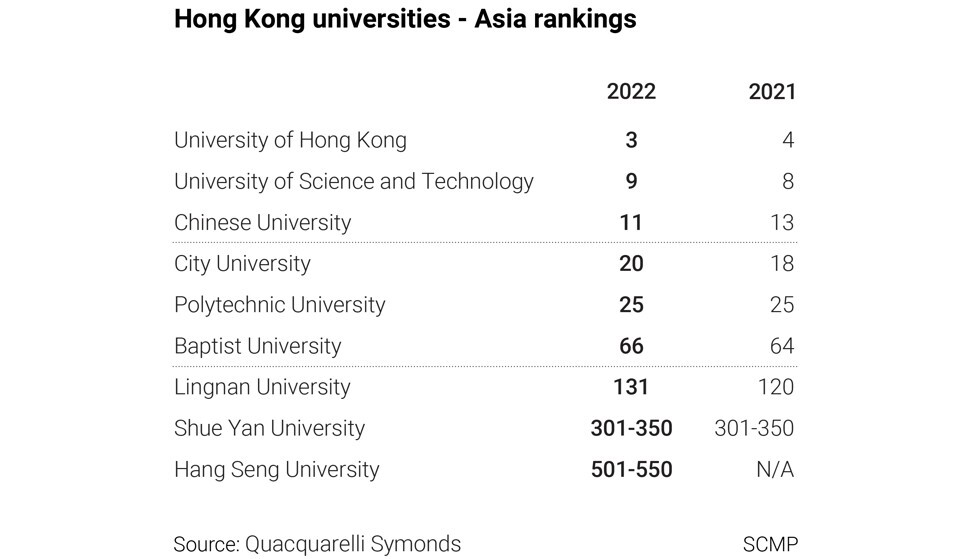
Hong Kong’s two oldest universities reverse recent slide down Asian rankings, but city’s faculty letting side down
- University of Hong Kong and Chinese University third and 11th respectively overall in new list of 687 institutions in region
- But only City University managed to place in top 50 when it came to staff’s academic qualifications
Hong Kong’s two oldest universities rose in the latest league table for Asia tertiary institutions after slipping in the past two years, but nearly all of the city’s establishments fared poorly in terms of faculty academic qualifications.
The University of Hong Kong (HKU) rose one place to third, while Chinese University (CUHK) was up two spots to 11th among the 687 Asian institutions rated in the latest list released by British firm Quacquarelli Symonds on Tuesday.
HKU shared the same ranking with Nanyang Technological University in Singapore, while the National University of Singapore topped the table for a fourth consecutive year, and Peking University was up five places to second.
Four other local universities fell in the rankings – Hong Kong University of Science and Technology (HKUST) dropped one place to ninth, City University fell two spots to 20th, Baptist University slid two places to 66th, and Lingnan University dropped from 120th to 131st.
Polytechnic University (PolyU) and Shue Yan University retained their previous rankings of 25th and 301st to 350th respectively. Hang Seng University, a college granted university status in 2018, was rated for the first time this year and placed in the group between 501st-550th.

The table accounts for 11 key indicators of university performance, including academic standing, faculty staff with PhDs, graduate employability, research quality and productivity, internationalisation on campus, and the diversity of each institution’s international collaborations.
While confirming the strengths of the local higher education system, Ben Sowter, the British firm’s research director, pointed out that City University was the only Hong Kong institution to make the top 50 in the metric of faculty staff’s academic qualifications.
“There is room for improvement for the proportion of staff with PhDs,” Sowter said.
PolyU scored just 3.6 points out of 100 in this indicator and ranked 301st, while Hang Seng University ranked 270th. HKU and CUHK were 52nd and 132nd respectively in this metric.
According to QS, the indicator was added in 2016 to assess the proportion of academic staff members qualified to PhD level, which is regarded as one of the factors affecting high-quality teaching. PolyU has been approached for comment.
Dr Fernando Cheung Chiu-hung, a retired social science academic at PolyU, said he was surprised to learn the university had scored badly.
“The university basically required all newly hired academics to have a PhD,” he said. “I know some faculties like engineering had a low number of staff with PhDs compared with other publicly funded universities in the past. But most of the new hires should now have a PhD.”
Asked whether the political fallout from the social unrest in 2019, such as the termination of some outspoken staff, as well as the disbandment of student unions, had an impact on the rankings, a spokeswoman for Quacquarelli Symonds said they did not ask questions about current affairs or policies.
“We can’t yet detect any patterns related to the impact of social unrest,” she said.

